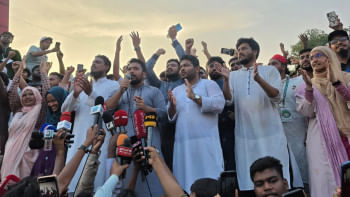Assessment system in primary education
It is a common tendency among us to identify a child publicly as meritorious or unmeritorious based on the result of an examination. This becomes a nationwide phenomenon after a public examination like "Shomaponi," JSC, SSC or HSC. This identification is simply injustice to a child whom we identify as unmeritorious. It even be called a crime (not in the eyes of any existing law but psychologically of course!) in the case of children of primary level, who are still so innocent that when we single out a child as unmeritorious it can make him feel so low and inferior to others that it can lead to permanent damage in his/her self-confidence and negatively impact his/her future. A psychologist can better describe and provide rationale for my remarks. But I want to depict this issue from other hard facts that we totally forget and ignore.
To identify merit or assess the performance of a child we need to base it on a logical, fair and equitable assessment system. Hence, we need standards or yardsticks to compare with, either through measurement or other methods. The NCTB has defined 50 Terminal Competencies (TC) to be achieved after completion of five years of schooling. These TCs are transformed into grade and subject-wise learning outcomes in different textbooks. But our existing "pen and paper" based terminal exams at each grade and the "Shomaponi" (popularly known as PSC) hardly assess these TCs and learning outcomes, because some memory-based informative questions (that are available in the exercise portion after each chapter of a textbook) have to be answered on paper.
While, development of language skills is essential for the early learners for proper learning, this written exam assesses mostly writing skill, ability to memorise, and partly reading skill of a child. This leads towards rote learning. We do not assess other skills of language i.e. listening, speaking and reading. There is another point; human beings have multiple intelligence, which they use during learning.
For example, a child who learns to multiply easily is not necessarily generally more intelligent than a child who has more difficulty in this task. The child who takes more time to master simple multiplication (i) may best learn to multiply through a different approach, (ii) may excel in a field outside mathematics, or (iii) may even be looking at and understanding the multiplication process at a fundamentally deeper level, or perhaps as an entirely different process. Such a fundamentally deeper understanding can result in what looks like slowness and can hide a mathematical intelligence potentially higher than that of a child who quickly memorises the multiplication table despite a less detailed understanding of the process of multiplication. Our teacher-centric, one-way and lecture based teaching system does not allow multiple intelligence to work.
An effective assessment system is an indispensible element of a curriculum along with its aims, goals and objectives; proper and appropriate contents and subject matters; and excellent instructional strategies and methods. The success of a curriculum will depend on how much of it has been realised or, in simple terms, what students have learned. The answer depends on the assessment system that is implemented in the thousands of schools in the country.
Assessment directly impacts learning and thereby teaching. According to renowned educational psychologist John B. Biggs, students learn what they think they will be assessed on, not what is in the curriculum. This is mostly true in Bangladesh since assessment of learning is mostly practiced in the form of summative assessment. Students and teachers tend to be less concerned about lessons or contents that are once covered in the examination.
Our students are accustomed to learning, and teachers put more effort in teaching, only those contents or lessons that are important or likely to be covered in the exam. This has resulted in rote learning becoming the most common vice in Bangladesh, and in underperformance of learning attainments and poor quality of education that are evident in national level assessment reports of both government and non-government agencies. Had we been able to use formative and summative assessment regularly in our education system, and use assessment of and for learning, our culture of learning and teaching would have been different. We did introduce, though partially, creative questioning system to tackle this overwhelming rote learning syndrome. Yet this has introduced a new type of rote learning in the form of question bank. Therefore we need to:
* Find alternative ways to show and publish the performance of a child, especially at the primary level, without hurting his/her self confidence;
* Come up with a comprehensive and appropriate assessment system at the primary level to address all TCs and skills of language. More emphasis should be given on formative assessment and using assessment as learning;
* Change our existing teaching system into one that caters to multiple intelligence and gives a fair chance to each child to learn.
The government has shown courage, skills and management ability to do seemingly impossible things like sending almost 23 crore books to schools (from grade 1 to 10) within the first week of January. The concerned authority should put emphasis on ensuring effective and scientific assessment while transforming the present revised curriculum into teaching instructions, teachers' guide, textbooks, teaching-learning materials, etc. I believe these will go a long way towards a brighter future of our children and the country as a whole. I believe the government has the ability to do it.

 For all latest news, follow The Daily Star's Google News channel.
For all latest news, follow The Daily Star's Google News channel. 



Comments